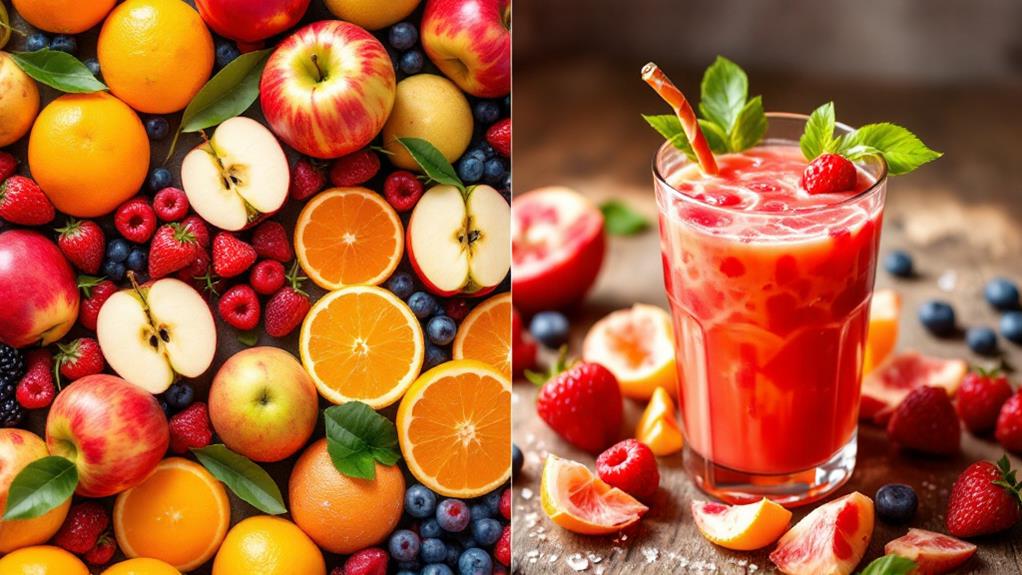Do Fruits Make You Fat? Debunking the Myths Around Fruit and Weight Gain

You won't get fat from eating fruits. They're low in calories and packed with vitamins, minerals, and antioxidants. The high water content helps keep you hydrated and enhances your metabolism. Plus, their fiber makes you feel full longer, reducing the chance of overeating. While fruits do contain natural sugars, their total impact on blood sugar is minimal when eaten whole. Portion control matters, but whole fruits generally don't lead to weight gain. Unlike juices, fruits retain their fiber, offering longer satiety and better digestion. For more on how fruits fit into a healthy diet, investigate further insights.
Nutritional Value of Fruits
Fruits' nutritional benefits make them a fantastic choice for anyone looking to manage their weight effectively. They're low in calories and packed with vital nutrients like vitamins, minerals, and antioxidants. This means you can enjoy their delicious flavors while supporting your body's health without the worry of excess calorie intake. The nutritional value of fruits goes beyond just vitamins and minerals, as their high water content aids in hydration and helps maintain a healthy metabolism, significant for effective weight management.
Moreover, fruits are rich in fiber, which plays a noteworthy role in promoting satiety. The fiber content helps you feel full longer, reducing the tendency to overeat. This makes fruits an excellent snack option and a smart supplement to meals if you're aiming to control your weight. Furthermore, the lower glycemic index of whole fruits compared to fruit juices helps minimize blood sugar spikes, making them suitable for balanced diets, even if you have diabetes.
Regularly consuming fruits also contributes to improved digestive health, which is vital for maintaining a healthy weight. So, regarding weight management, fruits offer a powerhouse of benefits that are hard to beat.
Common Fruit Myths
Many myths about fruits can lead to confusion when making dietary choices. You might hear that eating fruits causes weight gain because of their sugar content. In reality, fruits are low in calories and packed with fiber, which helps you feel full and supports weight management. This makes them a valuable part of a diet aimed at maintaining an ideal body weight.
There's also a misconception that people with diabetes should steer clear of fruits. While fruits are sweet, many have low to medium glycemic indexes, meaning they don't cause rapid spikes in blood sugar. Enjoying them with portion control can fit well into a healthy diabetes-friendly diet.
Another myth is that juicing fruits is superior to eating them whole. However, juicing strips away fiber, a crucial component for a healthy digestive system and satiety. Whole fruits, with their natural fiber intact, are the better choice.
It's significant to note that while fruits are nutritious, consuming them in excess without considering your complete calorie intake can still lead to weight gain. Ultimately, fruits don't detoxify your body; your liver and kidneys handle that naturally.
Sugar Content in Fruits

Understanding the sugar content in fruits can further dispel myths about their role in weight management. Unlike processed foods, fruits contain naturally occurring sugars like fructose, which come packed with fiber, vitamins, and minerals. This combination not only aids digestion but also supports general health. While some worry that the sugar in fruits might hinder your efforts to lose weight, most fruits have a low to medium glycemic index. This means they have a minimal impact on blood sugar levels compared to high-sugar processed foods.
It's crucial to keep in mind that portion control matters. Eating whole fruits is preferable to drinking fruit juices because the fiber in whole fruits helps you feel full, thanks to their low-calorie density and high water content. This can aid in weight loss and management by promoting satiety. The sugar content in fruits varies, with berries typically having lower sugar levels than tropical fruits like bananas and mangoes. If you're monitoring your sugar intake but still want to enjoy the benefits of fruits and vegetables, opting for berries could be a smart choice. Balancing your diet with a variety of fruits can support a healthy lifestyle.
Fruits and Satiety
In relation to feeling full and satisfied, fruits play a significant role due to their high water and fiber content. When you eat fruits, you consume a greater volume of food without piling on excessive calories. This combination helps you feel fuller longer, aiding in satiety. The fiber in fruits activates stretch receptors in your digestive system, improving those fullness signals and helping you control your calorie intake more effectively.
Incorporating fruits into your meals increases the general bulk of your diet, allowing you to enjoy a greater amount of food while still maintaining low-calorie density. This is vital for weight management. High-bulk foods like fruits support a negative calorie balance, which is fundamental for weight loss. By making you feel full, fruits can reduce your subsequent calorie consumption, steering you away from overeating.
Fruits have a low to moderate calorie density, making them a smart choice if you're aiming to manage your weight. They provide necessary nutrients while keeping the calorie count in check compared to other higher-calorie food options. So, when you're planning your meals, don't forget to include fruits to improve both satiety and nutritional value.
Whole Fruits vs. Juicing

With regard to maintaining the benefits of fruits in your diet, whole fruits hold the upper hand over juicing. When you consume whole fruits, you preserve their crucial fiber content, which aids digestion and helps you feel full longer. Juicing, on the other hand, often strips away this fiber, leading to faster digestion and the risk of consuming more sugar than intended. The absence of fiber in juices can make it easier to drink more, increasing calorie intake without the satiety benefits whole fruits provide.
Whole fruits are generally lower in calories per serving compared to juices, making them a better choice for weight management. You can enjoy larger portions of whole fruits, which can keep you fuller with fewer calories. Furthermore, many fruit juices contain added sugars and preservatives, while whole fruits offer natural sweetness and nutrients without these unwanted additives.
Consuming whole fruits also supports better blood sugar control, reducing the risk of metabolic issues. The fiber and nutrients in whole fruits help stabilize blood sugar levels, making them a smart choice for maintaining a healthy diet and preventing weight gain. Adopt whole fruits for their natural benefits and enjoy them guilt-free.
Cultural Beliefs About Fruits
While whole fruits are vital for maintaining a balanced diet, cultural beliefs about fruits can greatly influence how they're perceived and consumed. In diverse cultures, fruits are sometimes viewed as sacred or medicinal, often taking center stage in traditional practices and rituals. These beliefs can shape dietary practices and affect how fruits are integrated into everyday meals. Seasonal fruits, for instance, are celebrated in many communities, playing a significant role in culinary traditions and underscoring their significance in local diets.
However, misconceptions can arise from these cultural dietary practices. Some people might believe certain fruits can cause illness or weight gain, despite their nutritional benefits. These myths can deter individuals from enjoying the health advantages that fruits offer. That's why education on the nutritional benefits of fruits is fundamental. It helps bridge cultural gaps and dispels myths, encouraging a more balanced approach to fruit consumption.
Highlighting locally grown fruits can lead to better health outcomes and sustainability. Many cultures appreciate these natural foods' deep-rooted value, recognizing the benefits they bring. By understanding and respecting these cultural beliefs about fruits, you can make informed dietary choices that improve your well-being.




